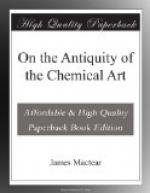Now, it is amply evident that, long before the various known facts could be collected and welded into one compact whole as a science, there must have existed great store of intellectual wealth, as well as mere hereditary practical knowledge of the various chemical facts.
I do not think it will be disputed that, until comparatively recent times, technical knowledge has constantly been in advance of theory, and that it is not too much to conclude that, no matter where we first find actual records of our science, its natal day must have long before dawned. Even in our day, when theoretical science, as applied to chemistry, has made such immense strides, how often do we find that it is only now that theory comes in to explain facts, known as such long previous, and those engaged in practical chemical work know how much technical knowledge is still unwritten, and what may even be called traditionary.
I purpose taking up the subject from this point of view, and attempting, with what little ability I can, to follow back to a still more remote period than that of Geber and the Arabian school of philosophers the traces of what has often been called the divine art.
An aspect of the question that has often presented itself to me is this, that the history of what we call our world extends over some 4000 years before Christ and 1878 years since, so that, according to the usually accepted idea, if chemistry originated in Arabia in the eighth century, it was not known during say the first 5000 years of the world’s history, but has advanced to its present high position amongst the sciences in the last 1000 years.
I hope to be able to show that, while the Arabian school of philosophy get the credit of originating most of the sciences, that it is as undeserved in the case of chemical science as in that of astronomy or mathematics. At the same time let us not undervalue the services rendered to science by this school: it is to them we owe the distribution of the knowledge of most of our sciences, and the Arabic literature of most of these was widely spread abroad over all the known world of their time.
The central portion of Baghdad between the eastern and western portions of the Old World, and the wise and enlightened policy of its rulers, which welcomed to its schools, without reference to country or creed, the wise and learned men of every nation, drew to it as to a centre the accumulated wisdom and knowledge of both the rising and the setting sun. Long ere this time, however, we find, as regards the Greeks, that they constantly travelled eastward in search of learning, while we know that the expedition of Alexander the Great, about B.C. 327, in which he traversed a considerable portion of India, had already opened up the store-houses of Indian lore to the minds of the West.
In connection with this, the following extract from an old book: called The Gunner, dated 1664, is interesting:—




